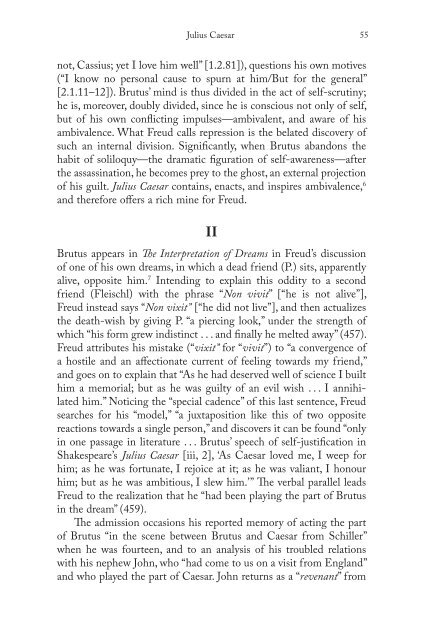Bloom's Literary Themes - ymerleksi - home
Bloom's Literary Themes - ymerleksi - home
Bloom's Literary Themes - ymerleksi - home
You also want an ePaper? Increase the reach of your titles
YUMPU automatically turns print PDFs into web optimized ePapers that Google loves.
Julius Caesar 55<br />
not, Cassius; yet I love him well” [1.2.81]), questions his own motives<br />
(“I know no personal cause to spurn at him/But for the general”<br />
[2.1.11–12]). Brutus’ mind is thus divided in the act of self-scrutiny;<br />
he is, moreover, doubly divided, since he is conscious not only of self,<br />
but of his own conflicting impulses—ambivalent, and aware of his<br />
ambivalence. What Freud calls repression is the belated discovery of<br />
such an internal division. Significantly, when Brutus abandons the<br />
habit of soliloquy—the dramatic figuration of self-awareness—after<br />
the assassination, he becomes prey to the ghost, an external projection<br />
of his guilt. Julius Caesar contains, enacts, and inspires ambivalence, 6<br />
and therefore offers a rich mine for Freud.<br />
II<br />
Brutus appears in The Interpretation of Dreams in Freud’s discussion<br />
of one of his own dreams, in which a dead friend (P.) sits, apparently<br />
alive, opposite him. 7 Intending to explain this oddity to a second<br />
friend (Fleischl) with the phrase “Non vivit” [“he is not alive”],<br />
Freud instead says “Non vixit” [“he did not live”], and then actualizes<br />
the death-wish by giving P. “a piercing look,” under the strength of<br />
which “his form grew indistinct . . . and finally he melted away” (457).<br />
Freud attributes his mistake (“vixit” for “vivit”) to “a convergence of<br />
a hostile and an affectionate current of feeling towards my friend,”<br />
and goes on to explain that “As he had deserved well of science I built<br />
him a memorial; but as he was guilty of an evil wish . . . I annihilated<br />
him.” Noticing the “special cadence” of this last sentence, Freud<br />
searches for his “model,” “a juxtaposition like this of two opposite<br />
reactions towards a single person,” and discovers it can be found “only<br />
in one passage in literature . . . Brutus’ speech of self-justification in<br />
Shakespeare’s Julius Caesar [iii, 2], ‘As Caesar loved me, I weep for<br />
him; as he was fortunate, I rejoice at it; as he was valiant, I honour<br />
him; but as he was ambitious, I slew him.’ ” The verbal parallel leads<br />
Freud to the realization that he “had been playing the part of Brutus<br />
in the dream” (459).<br />
The admission occasions his reported memory of acting the part<br />
of Brutus “in the scene between Brutus and Caesar from Schiller”<br />
when he was fourteen, and to an analysis of his troubled relations<br />
with his nephew John, who “had come to us on a visit from England”<br />
and who played the part of Caesar. John returns as a “revenant” from
















